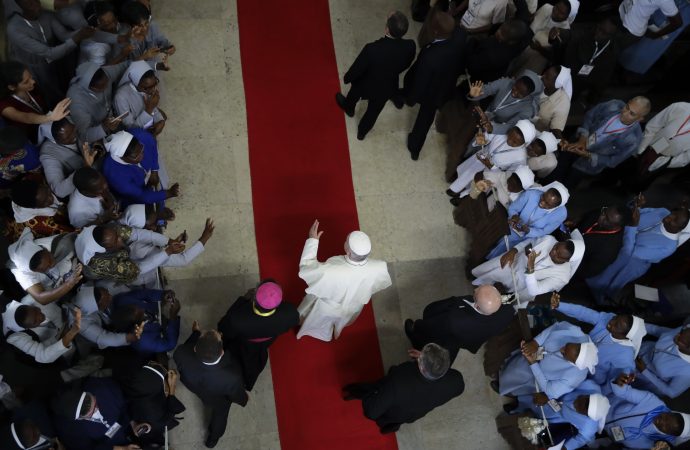Speaking to his own foot soldiers Thursday, Pope Francis called on priests in Mozambique to be more generous, like the Virgin Mary, to fight what he called a “crisis of priestly identity.”
Francis said the Church is called to “face reality as it is,” accepting that it must find its place in new scenarios, always taking into account that the “promised land” is before us rather than in the past. Failing to do so, he said, leads the Church to “announce a dreary message that attracts no one and sets no one’s heart afire,” instead of proclaiming the Good news.
Speaking to bishops, priests, religious, consecrated and seminarians, catechists and activists of the Catholic Church in Mozambique, Francis thanked those who posed questions, as it speaks of the “difficult times and challenges you faced.”
As one of them said, the local church is “part of a heroic people” that has experienced suffering yet keeps hope alive.
Before addressing the religious community, Francis welcomed faithful from Xai-Xai, Mozambique, in the papal embassy where he is staying. It’s a community which, in 2000, then-Cardinal Jorge Mario Bergoglio, Archbishop of Buenos Aires and today Pope Francis, twinned with the archdiocese he led.
According to Vatican spokesman Matteo Bruni, during the private meeting with this community, the Argentine pontiff recalled the origins of the relationship between the dioceses and how the exchange strengthened priests, religious and seminarians in their mission, opening them to an apostolic perspective.
He stressed prayer for one another, the value of children, the wealth of a nation, and the elderly: “Children and the elderly are the treasure of a people, and the way we take care of them measures the greatness of a people,” he said.
The pope’s remarks to the religious turned on the “two Annunciations,” that of an angel appearing to Zacharias at the temple to announce the coming of St. John the Baptist, and that of an angel appearing to Mary to announce that she’s going to give birth to the son of God.
From those accounts, Francis said, it’s possible to “find the incentive needed to respond with the same generosity and concern as Mary,” particularly regarding a crisis in the priesthood.
A local priest told the pope that priests in Mozambique live their mission “surrounded by many difficulties and even adversity, such as an insufficient number of priests,” a scarcity of means to carry out their activities, a “somewhat superficial evangelization,” the problem of inculturation of the faith, people worshiping more than one god and the spread of “neo-Pentecostal sects,” with simplistic and populist messages.
Notwithstanding all this, the priest acknowledged, “the greatest challenge of all is in ourselves, our resistance to God, who calls us to walk a path of holiness and to be priests according to the Sacred Heart of Jesus.”
Francis said that “in a crisis of priestly identity, sometimes we need to step away from important and solemn places and return to the places from which we were called, where it was clear that the initiative and the power was from God.”
Without meaning to, the pope said, sometimes priests identify their daily activities with rituals, meetings and conversations, with a “hierarchical” place at said table or meeting.
“I do not think it is an exaggeration to say that the priest is very little indeed: the incomparable grandeur of the gift granted us sets us among the least of men,” Francis said.
“The priest is the poorest of men unless Jesus enriches him by his poverty, the most useless of servants unless Jesus calls him his friend, the most ignorant of men unless Jesus patiently teaches him as he did Peter, the frailest of Christians unless the Good Shepherd strengthens him in the midst of the flock,” he said.
When she said “yes,” Jesus’ mother didn’t think about herself but trusted in God, Francis said.
“It is a constant struggle to experience our relationship with God like Zechariah, like a doctor of the law: always complying, always judging whether the recompense is proportionate to the work done, whether it is my due if God blesses me, whether the Church is bound to recognize my virtues and my hard work,” he said.
“We are to rejoice with couples who marry; we are to laugh with the children brought to the baptismal font; we are to accompany young fiancés and families; we are to suffer with those who receive the anointing of the sick in their hospital beds; we are to mourn with those burying a loved one,” the pope said.
Francis underlined the importance of female catechists, as a reminder that nothing should dampen the enthusiasm for evangelizing. When Mary visited her cousin Elisabeth, Zacharias’s wife, the two Annunciations united in “one great celebration of praise.”
“There is a part of Israel that grasped the profound and dizzying change in God’s plan, and allowed itself to be visited,” Francis said. “As a result, the child leaps in the womb. For a moment, in a patriarchal society, the world of men steps back and is silent, like Zechariah.”
Francis will be in Mozambique until Friday, when he flies to Madagascar, where he’ll remain until the 10th, with a day trip to Mauritius on the ninth.

